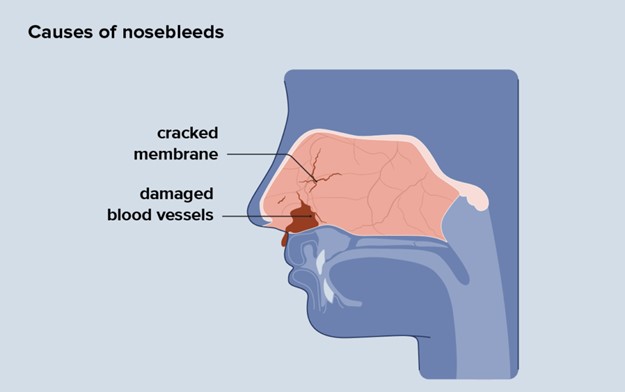A woman is in her seventh month of pregnancy.
She has been reporting nasal congestion and occasional epistaxis. The nurse suspects that:
This is a normal respiratory change in pregnancy caused by elevated levels of estrogen.
This is an abnormal cardiovascular change, and the nosebleeds are an ominous sign.
The woman is a victim of domestic violence and is being hit in the face by her partner.
The woman has been using cocaine intranasally.
The Correct Answer is A
This is a normal respiratory change in pregnancy caused by elevated levels of estrogen. Estrogen increases blood flow and causes the nasal mucosa to swell, leading to congestion and nosebleeds. This condition is called pregnancy rhinitis and affects up to 20% of pregnant women.

Choice B is wrong because this is not an abnormal cardiovascular change, and the nosebleeds are not an ominous sign. They are usually harmless and do not affect the pregnancy outcome.
Choice C is wrong because there is no evidence that the woman is a victim of domestic violence.
This is a serious accusation that should not be made without proper assessment and screening.
Choice D is wrong because there is no indication that the woman has been using cocaine intranasally. Cocaine use can cause nasal damage and bleeding, but it can also have other signs and symptoms such as agitation, euphoria, dilated pupils, increased heart rate and blood pressure, and risk of miscarriage or preterm labor.
Nursing Test Bank
Naxlex Comprehensive Predictor Exams
Related Questions
Correct Answer is C
Explanation
This is because self-monitoring of blood glucose allows children to learn how their blood sugar levels change in response to different factors such as food, exercise, stress, and medication.
It also helps them to adjust their insulin doses and dietary intake accordingly. Self-monitoring of blood glucose can improve glycemic control and reduce the risk of complications.
Choice A is wrong because it is not a less expensive method of testing.
Self-monitoring of blood glucose requires a glucose meter, test strips, lancets, and a logbook, which can be costly for some families.
Choice B is wrong because it is not less accurate than laboratory testing.
Self-monitoring of blood glucose can provide accurate and reliable results if done correctly and regularly.
Laboratory testing is usually done periodically to measure the average blood sugar level over the past 2 to 3 months (hemoglobin A1c).
Choice D is wrong because it implies that the parents are not involved in the child’s diabetes management.
Parents should still provide support and guidance to their children with diabetes, especially when they are young or newly diagnosed. Parents should also monitor their child’s blood glucose levels and help them with insulin administration if needed.
Correct Answer is A
Explanation
A brilliant, uniform red reflex in both eyes is a sign of a healthy retina and optic nerve. The red reflex is the reflection of light from the retina that varies in color depending on the patient’s skin tone. It can be seen by holding the ophthalmoscope directly in front of your eye and asking the patient to focus on a point in the distance.
Choice B is wrong because an abnormal finding would be an absent or asymmetric red reflex, which could indicate cataracts, retinal detachment, or other eye diseases.
Choice C is wrong because a possible visual defect would not affect the red reflex, but rather the visual acuity or field of vision of the patient.
A vision screening would involve testing the patient’s ability to read letters or numbers at different distances.
Choice D is wrong because small hemorrhages would not cause a brilliant, uniform red reflex, but rather dark spots or blotches on the retina that can be seen with the ophthalmoscope.
Hemorrhages can be caused by diabetes, hypertension, or trauma.
Whether you are a student looking to ace your exams or a practicing nurse seeking to enhance your expertise , our nursing education contents will empower you with the confidence and competence to make a difference in the lives of patients and become a respected leader in the healthcare field.
Visit Naxlex, invest in your future and unlock endless possibilities with our unparalleled nursing education contents today
Report Wrong Answer on the Current Question
Do you disagree with the answer? If yes, what is your expected answer? Explain.
Kindly be descriptive with the issue you are facing.
